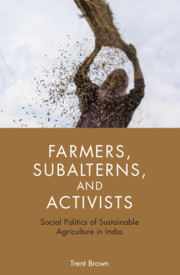Book contents
- Frontmatter
- Dedication
- Contents
- List of Images
- Acknowledgements
- 1 Introduction
- 2 India's Agrarian Crisis: A Gramscian View
- 3 Embedded in Power: Potentials and Constraints of Sustainable Agriculture
- 4 The Kheti Virasat Mission: People's Movement or Agrarian Populism?
- 5 The Tamil Nadu Organic Farmers’ Movement: The Limits of Participatory Approaches
- 6 The Beej Bachao Andolan: How ‘Grassroots’ is the Grassroots?
- 7 Conclusion
- Bibliography
- Index
2 - India's Agrarian Crisis: A Gramscian View
Published online by Cambridge University Press: 08 July 2018
- Frontmatter
- Dedication
- Contents
- List of Images
- Acknowledgements
- 1 Introduction
- 2 India's Agrarian Crisis: A Gramscian View
- 3 Embedded in Power: Potentials and Constraints of Sustainable Agriculture
- 4 The Kheti Virasat Mission: People's Movement or Agrarian Populism?
- 5 The Tamil Nadu Organic Farmers’ Movement: The Limits of Participatory Approaches
- 6 The Beej Bachao Andolan: How ‘Grassroots’ is the Grassroots?
- 7 Conclusion
- Bibliography
- Index
Summary
Low external input sustainable agriculture is often presented as a solution to an ‘agrarian crisis’ said to affect much of rural India. Broadly speaking, this crisis represents a breakdown in the functioning of rural social, economic, and ecological systems, such that the agrarian sector has a diminished capacity to provide sustainable livelihood options for the country's largely poor rural majority. This chapter puts the idea of an ‘agrarian crisis’ into historical perspective. Throughout the chapter, I adopt a Gramscian theoretical framework, highlighting the ways in which hegemonic groups have influenced India's rural development trajectory since Independence. This entails a detailed analysis of the classes and class fractions that have benefitted from dominant approaches to rural development and the ways in which they have ensured that these benefits continue to flow in their direction. Furthermore, it explores how developments in civil society have aided these hegemonic groups in establishing popular consent for a largely inequitable food system. Ultimately, however, I argue that this consent has now broken down, such that the agrarian crisis has now led to a ‘crisis of authority’ in which the credibility of hegemonic groups and ideologies in rural India can no longer be sustained.
Discussions of India's agrarian crisis tend to oscillate between despair and utopianism. The current scenario is presented as bleak, deeply entrenched, and degenerative, while the proposed solutions lack the clarity of a precise political agenda. It is in this sense that a Gramscian perspective can make a unique contribution. Gramsci encourages an analysis of social processes already in motion that may lead to the development of alternative social, economic, and political forms (imperfect as these may be). In arguing that contemporary rural India can be analysed not only as an ‘agrarian crisis’ but also as a Gramscian ‘crisis of authority’, I suggest that the existing hegemonic structures that have maintained consent for particular models of agrarian development are no longer effective. As the old hegemony loses its grip on the popular imagination, new ways of thinking about the future can emerge. It is thus possible for new alternatives to be articulated (low external input sustainable farming being just one), as formerly subaltern groups begin to build alliances with those disaffected by the current approach, establishing new bases of power. This process takes place within the domain Gramsci described as ‘civil society’.
- Type
- Chapter
- Information
- Farmers, Subalterns, and ActivistsSocial Politics of Sustainable Agriculture in India, pp. 27 - 54Publisher: Cambridge University PressPrint publication year: 2018



